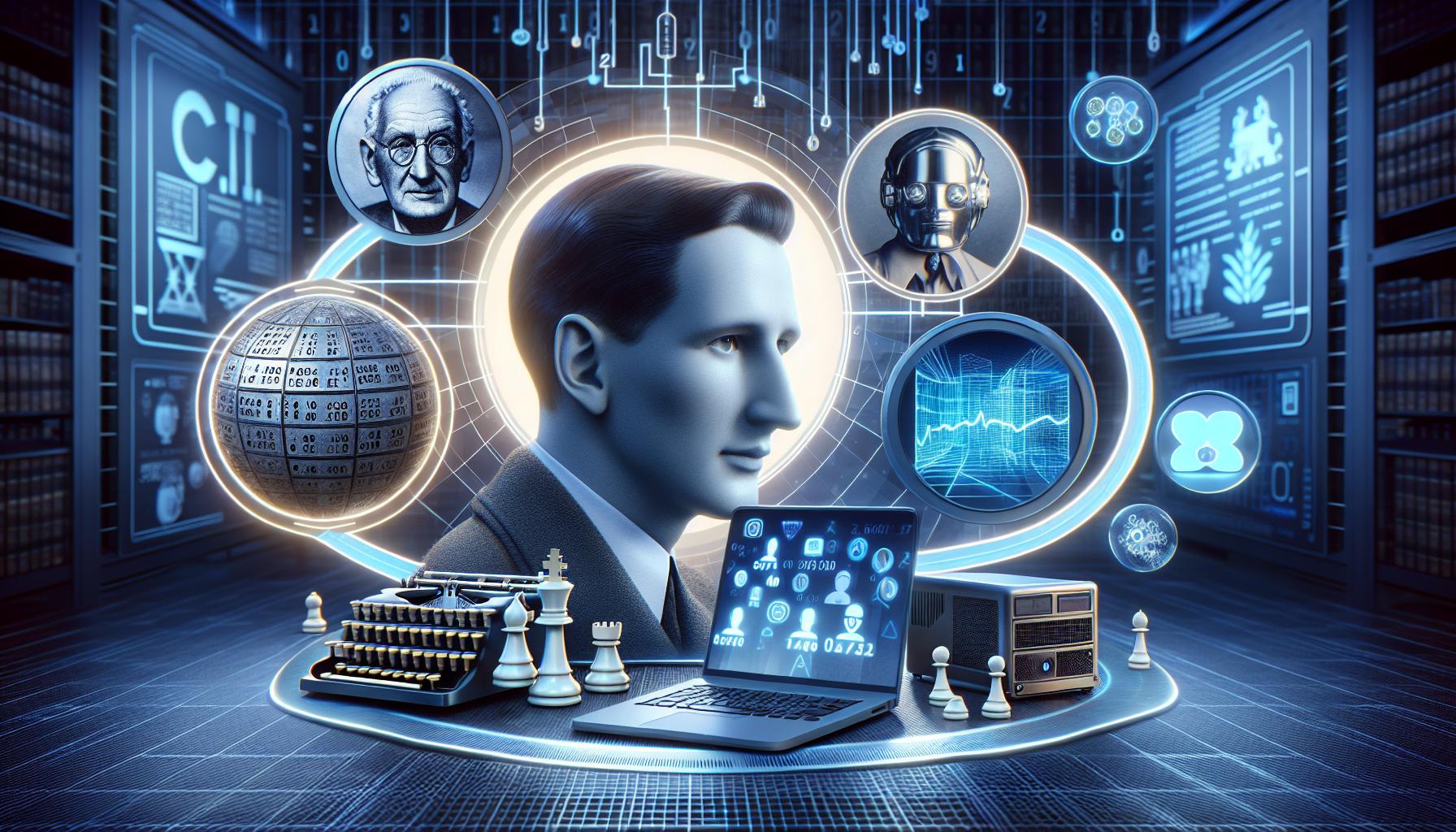Key Takeaways
- Definition of AI: Artificial intelligence refers to computer systems designed to perform tasks requiring human-like intelligence, including problem-solving, learning, and decision-making.
- Core Components: Key components of AI involve machine learning, which allows systems to learn from data; natural language processing, enabling understanding and interaction with human language; and robotics, which integrates AI with physical machines for automation.
- Industry Applications: AI is reshaping various industries, including healthcare for disease diagnosis, finance for fraud detection, manufacturing for automation, and retail for personalized customer experiences.
- Challenges and Ethics: Challenges such as bias in AI and privacy concerns are crucial to address, necessitating diverse data representation and stringent data protection regulations to ensure fairness and user trust.
- Future Innovations: The future of AI holds transformative innovations in healthcare, transportation, and manufacturing, alongside the development of ethical frameworks to guide responsible AI use.
- Societal Impact: AI is set to influence job markets, healthcare accessibility, education, and economic growth, highlighting the need for strategic navigation of its opportunities and associated challenges.
Artificial intelligence, or AI, is revolutionizing the way people interact with technology. It’s not just a buzzword; it’s a powerful tool transforming industries from healthcare to finance. As machines become capable of mimicking human intelligence, understanding what AI truly means is essential.
At its core, AI refers to the development of computer systems that can perform tasks typically requiring human intelligence. These tasks include problem-solving, learning, and decision-making. With advancements in machine learning and natural language processing, AI systems are increasingly sophisticated, making them an integral part of modern life. Exploring the definition of artificial intelligence reveals its potential and the implications it holds for the future.
What is Artificial Intelligence Definition
Artificial intelligence (AI) refers to the creation of computer systems designed to execute tasks typically associated with human intelligence. These tasks include problem-solving, learning from experience, understanding natural language, and making informed decisions.
AI encompasses various subfields, with machine learning and natural language processing being prominent examples. Machine learning enables computers to analyze vast datasets and identify patterns, allowing systems to improve performance over time. Natural language processing equips computers to comprehend and respond to human language, facilitating interactions between humans and machines.
The significance of AI lies in its ability to transform industries. In healthcare, AI assists in diagnosing diseases and personalizing treatment plans. In finance, AI algorithms enhance fraud detection and streamline investment strategies. As technology evolves, the potential applications of AI grow, underscoring the need to grasp its implications thoroughly.
By understanding the definition and capabilities of artificial intelligence, stakeholders can better navigate the future opportunities and challenges it presents.
Historical Background

Artificial intelligence (AI) has evolved significantly since its inception, influenced by various developments and milestones that shaped its trajectory.
Early Developments
Early work in AI dates back to the mid-20th century. In 1950, Alan Turing introduced the concept of a machine’s ability to exhibit intelligent behavior, laying the groundwork for AI research. In 1956, the Dartmouth Conference marked the birth of AI as a field, bringing together researchers to discuss machine intelligence. Early programs like the Logic Theorist and General Problem Solver demonstrated initial capabilities in problem-solving and theorem proving. These foundational developments sparked interest and laid the groundwork for future advancements in AI.
Milestones in AI
Several key milestones stand out in AI’s progression:
- 1966: Joseph Weizenbaum created ELIZA, one of the first natural language processing programs, which simulated conversation with a human user.
- 1980: The introduction of expert systems, such as MYCIN, revolutionized AI by applying knowledge to specific domains like medicine.
- 1997: IBM’s Deep Blue defeated world chess champion Garry Kasparov, showcasing the potential of AI in strategic problem-solving.
- 2011: IBM’s Watson won the game show Jeopardy!, demonstrating AI’s ability to process and analyze vast amounts of information quickly.
- 2018: Google Duplex, a conversational AI, showcased significant advancements in natural language understanding by successfully making phone calls to book appointments.
These milestones reflect AI’s evolution from basic algorithms to complex systems capable of performing sophisticated tasks, enhancing its importance across various industries.
Key Components of Artificial Intelligence

Artificial intelligence consists of several essential components that contribute to its effectiveness and functionality. The major components include machine learning, natural language processing, and robotics.
Machine Learning
Machine learning is a subfield of AI focused on developing algorithms that analyze data, learn from it, and make predictions or decisions. This process involves training models on large datasets, allowing them to identify patterns and improve their accuracy over time. Supervised learning uses labeled data, while unsupervised learning analyzes unstructured data to discover hidden patterns. Reinforcement learning trains algorithms through trial and error, optimizing performance based on feedback from the environment.
Natural Language Processing
Natural language processing (NLP) enables machines to understand, interpret, and respond to human language in a way that is both meaningful and contextually relevant. NLP encompasses tasks such as speech recognition, sentiment analysis, and language translation. Techniques like tokenization, parsing, and named entity recognition help break down and analyze language structure, enhancing machine comprehension. Advanced models, such as transformers, allow for improved contextual understanding, enabling more sophisticated interactions between humans and machines.
Robotics
Robotics integrates AI with physical machines, creating systems capable of performing complex tasks autonomously. These systems rely on sensors, actuators, and control algorithms to navigate and interact with their environment. AI enhances robotics by enabling machines to learn from experience and adapt to changing conditions. Applications range from industrial automation and precision agriculture to healthcare robots assisting in surgeries and patient care. The combination of robotics and AI drives innovation across multiple sectors, increasing efficiency and expanding capabilities.
Applications of Artificial Intelligence

Artificial intelligence (AI) has numerous applications across various sectors, demonstrating its versatility and impact. This section explores industry-specific use cases and common everyday applications of AI technology.
Industry Use Cases
- Healthcare: AI assists in disease diagnosis and treatment planning. Machine learning algorithms analyze medical images to detect conditions such as cancer more accurately and swiftly.
- Finance: AI enhances fraud detection by identifying unusual transaction patterns in real-time. Investment firms utilize AI-driven analytics for optimizing portfolios and predicting market trends.
- Manufacturing: AI-powered robots improve efficiency by automating repetitive tasks. Predictive maintenance algorithms reduce downtime by forecasting equipment failures.
- Retail: AI personalizes customer experiences through recommendation systems. Inventory management benefits from predictive analytics that optimize stock levels based on demand forecasts.
- Transportation: AI plays a pivotal role in developing autonomous vehicles. Traffic management systems analyze data to improve flow and reduce congestion.
- Virtual Assistants: AI-driven platforms like Siri and Alexa assist users with tasks such as setting reminders and controlling smart home devices.
- Social Media: AI algorithms curate content, enhancing user experiences by personalizing feeds and suggesting new connections.
- Streaming Services: AI analyzes user behavior to recommend movies and music, improving user engagement on platforms like Netflix and Spotify.
- E-commerce: AI chatbots provide instant customer support, answering queries and guiding users through purchase processes.
- Smart Devices: AI capabilities enhance smart appliances, enabling functions like optimizing energy usage based on user preferences.
AI’s application across various industries and everyday life illustrates its significance in transforming not only operational processes but also user experiences.
Challenges and Ethical Considerations
Artificial intelligence (AI) presents significant challenges and ethical considerations as it continues to evolve. Key issues include bias in AI systems and privacy concerns that impact users and society.
Bias in AI
Bias in AI manifests when algorithms produce unfair outcomes, often reflecting historical prejudices or data representation issues. Diverse training datasets, which represent various demographic groups, minimize bias. For instance, facial recognition systems have shown inaccuracies across different ethnicities, leading to misidentifications. Addressing bias involves implementing fairness-aware algorithms and conducting regular audits to identify and rectify biased outcomes. Moreover, involving diverse teams in AI development promotes comprehensive perspectives that encourage equitable tech solutions.
Privacy Concerns
Privacy concerns arise with AI’s ability to collect, process, and analyze vast amounts of personal data. For example, AI systems in social media platforms track user behavior, leading to potential misuse of sensitive information. The implementation of stringent data protection regulations, such as the General Data Protection Regulation (GDPR), seeks to address these issues by ensuring transparency and user consent. Additionally, adopting privacy-preserving techniques, like differential privacy, can protect individual data while maintaining analytics capabilities. Transparency about data practices fosters user trust and accountability in AI systems.
Future of Artificial Intelligence
The future of artificial intelligence (AI) holds immense possibilities driven by continuous innovations and impactful societal changes. Advancements in AI technologies are expected to reshape industries and everyday life.
Innovations on the Horizon
AI innovations are emerging rapidly across various fields. Key areas include:
- Healthcare innovations: AI facilitates early detection of diseases through advanced imaging techniques and predictive analytics.
- Autonomous systems: Utilizing machine learning algorithms, drones and robots enhance efficiency in logistics and delivery operations.
- Natural language advancements: AI systems are improving communication with human-like interactions through more sophisticated natural language processing models.
- Smart manufacturing: AI-driven automation increases production capabilities and improves quality control, reducing waste and costs.
- AI ethics frameworks: Efforts to develop guidelines and standards for responsible AI use aim to address bias and transparency issues.
Potential Impact on Society
AI’s integration into society promises significant transformations across multiple dimensions. Notable impacts include:
- Job displacement: Automation may replace certain jobs, necessitating workforce retraining and adaptation.
- Healthcare accessibility: AI can democratize healthcare by providing remote diagnostics and personalized treatment plans, enhancing access for underserved populations.
- Education transformation: AI-powered personalized learning solutions enable tailored educational experiences based on individual student needs and abilities.
- Economic growth: AI technologies can drive productivity and innovation, potentially contributing to robust economic development.
- Privacy enhancement: With advanced data protection measures, AI can secure personal information while maintaining user trust.
The ongoing evolution of AI technology fosters opportunities and challenges that society must navigate strategically.
Future of Technology And Various Industries
Artificial intelligence stands as a pivotal force shaping the future of technology and various industries. Its ability to mimic human intelligence through machine learning and natural language processing opens doors to unprecedented advancements. As AI continues to evolve, its applications will only expand, transforming sectors like healthcare and finance while enhancing everyday experiences.
However, with great potential comes significant responsibility. Addressing challenges such as bias and privacy concerns is crucial for fostering trust in AI systems. Stakeholders must remain vigilant and proactive in navigating the ethical implications of AI’s growth. Understanding AI’s definition and impact is essential for harnessing its capabilities responsibly and effectively.

